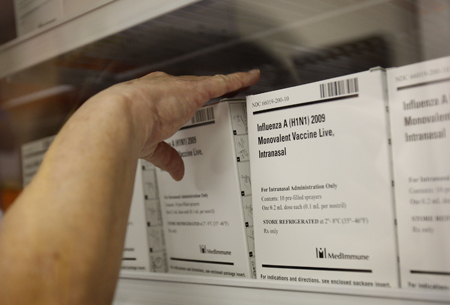Medical assistants can now give all shots
Reversing a position it has taken publicly for weeks, the Nevada State Board of Medical Examiners determined Tuesday that state law allows medical assistants to administer everything from flu shots to Botox.
A five-paragraph statement signed by Dr. Charles Held, president of the medical board, said the agency "will return to its previous policies and interpretations."
This means that pediatricians and other doctors will be able to more easily meet the demand for flu shots, childhood vaccinations and other critical medical procedures they feared they wouldn't be able to provide to patients. They worried that, with flu season approaching and with a stockpile of swine flu vaccine coming in, local health districts would have to shoulder the burden.
Physicians had warned Gov. Jim Gibbons that there wouldn't be enough health professionals to administer the shots.
"Sanity has been restored," said Assembly Speaker Barbara Buckley, D-Las Vegas, who worked with Senate Majority Leader Steven Horsford, D-Las Vegas, and representatives of the governor's office and attorney general's office to broker the new position with the board.
Buckley said the board, which was concerned about some medical assistants injecting the anti-wrinkle drug Botox without proper supervision, ultimately responded to the pressure of pediatricians, kidney doctors and cancer doctors.
"They were talking about chaos, about not being able to practice medicine," she said.
In mid-September, Louis Ling, the medical board's executive director, said his reading of a 30-year-old law on administering prescription medications -- which did not specifically name medical assistants -- led him to believe that medical assistants had been illegally giving Botox shots.
Further research, he said, made him realize that it was illegal for medical assistants to give any shots. The board then set about enacting emergency regulations that would have allowed medical assistants to give flu shots and vaccines but prevent them from administering cosmetic injections.
"It was absurd," said Buckley. "You can't let concerns about the way a few medical assistants administer Botox stop thousands of Nevadans from getting flu shots.
"What you're doing is throwing out the baby with the bath water," she said.
For more than 20 years, Buckley said, the medical board interpreted the state's administrative code as allowing medical assistants to serve as an extension of a doctor if they were "under the direction and supervision of the physician."
Although it is true, she said, that medical assistants are not explicitly named under Nevada law as being able to administer prescription drugs, she also said that their ability to legally give shots is implied.
"It's something that is delegated under a doctor's license," she said, adding that other states follow the same process.
Key to the brokered deal, Buckley said, is the understanding that medical assistants must work "under direct supervision" of a physician.
What that apparently means is this: The doctor should be in the same facility where a medical assistant is administering prescription medications.
"I think most people would assume 'direct supervision' means a physician would be in the confines of the clinic," said pediatrician Dr. David Parks.
State Sen. Valerie Wiener, D-Las Vegas, chairman of the Legislative Committee on Health Care, said: "It makes sense to me that the physician would be close by. But we'll spell that out in new legislation."
When trained, medical assistants can deliver the flu mist inhalation vaccine that is being delivered to Nevada to help fight the spread of the H1N1 virus.
Parks, clinic director at Kids Healthcare on Maryland Parkway, was ecstatic about the board's action Tuesday.
"Not allowing medical assistants to give shots slowed up our process so much that we had to cut back on well baby physicals," he said.
Medical assistant Rebecca Luth, who said she makes up to $300 an hour giving Botox injections, said her prayers had been answered.
Luth said, however, she expects that the state will enact new legislation at the 2011 session that prohibits medical assistants from injecting Botox.
"That seems pretty clear," she said. "So I may go after my nursing degree."
In his statement, Held said the board will work with Wiener's committee and create a permanent regulation regarding the use of medical assistants by doctors and physician assistants.
The board, Ling had said, worried about the proliferation of medical spas where medical assistants seemed to be working without a doctor's supervision when injecting Botox and other cosmetic fillers.
What started the crisis, according to Ling, was the arrest of medical assistant Betty Guerra on charges she injected Botox and did suturing without a doctor on premises.
Guerra, who faces 10 felony counts for practicing medicine without a license, said she did everything under the direct supervision of a doctor.
Ling has said that after Guerra's arrest so many medical personnel were calling the governor and medical boards about what medical assistants could or could not do that he wanted to clear up the confusion.
But that confusion was not cleared up until the board officially returned Tuesday to its old interpretation of the law.
Gibbons' spokesman Daniel Burns said the governor is pleased with the resolution.
"All he cared about is that people could get their shots," he said. "He wasn't involved in the Botox part of this at all."
Ling had called the emergency board meeting on Sept. 18 where proposed new rules would permit medical assistants to give flu shots while prohibiting cosmetic injections.
But the new rules were later blocked after attorney Jacob Hafter, who represents medical spa owners, successfully argued in court that the board violated the state's open meeting law by cutting off public comment at the meeting.
Hafter said Tuesday that his position has always been that a physician can delegate work to medical assistants.
"What's so sad is that none of this had to happen," he said. "If you want new legislation, you go to the Legislature."
Contact reporter Paul Harasim at pharasim@reviewjournal.com or 702-387-2908.




























